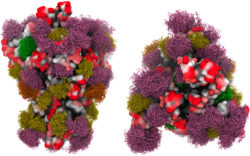COVID-19 data for Clarke County continued to show an increase in new cases and hospitalizations last week as the Delta variant spreads. According to public health experts, the rise in new cases and hospitalization is particularly prevalent among those who have not been vaccinated.
Clarke County saw new cases of COVID-19 nearly double last week. There were 95 new cases total, according to the Georgia Department of Public Health, with 74 new confirmed cases and an additional 21 positive antigen tests. That was up from 55 new cases two weeks ago and just nine four weeks ago.
The seven-day moving average increased from 5.9 daily new cases to 10.4 as of July 23. In total, there have been 13,111 confirmed cases and 2,304 positive antigen tests in Clarke County since the pandemic began last year.
At UGA, there were 12 positive cases for the week of July 12-18, but UGA’s positive tests are self-reported, and there were only 148 surveillance tests done for the week.
The increase in cases is having more of an impact on Athens area hospitals than previous weeks, with three additional hospitalizations and one new death from COVID-19 last week among Clarke County residents. In Northeast Georgia’s Region E, which includes Athens hospitals that serve many of the surrounding counties, 35 patients were hospitalized with COVID-19, up 10 from the previous week, making up 6.5% of all patients.
More importantly, intensive care units are nearly full again. The number of ICU beds in use rose 19%, and Region E ICUs are now 89% full. As public health expert Amber Schmidtke noted in her weekly newsletter, an increase in COVID-19 patients likely means fewer hospital beds available for everyone.
“People who need a hospital bed for COVID-19 are having extended stays,” Schmidtke said. “As patient census [and beds occupied] rises, hospitals will have a harder time admitting new patients for anything, not just COVID-19.”
As UGA students return to town for the fall semester and CCSD prepares for the first day of classes, public health experts continue to be concerned about low vaccination rates among college-age students and spread among K-12 students.
Over the summer, UGA and the University System of Georgia used social media and other marketing efforts to encourage students to visit one of 15 USG campuses around the state to get vaccinated. However, data from UGA’s weekly update, at least at this point, does not bode well for vaccination rates among college students if data trends continue. Last week UGA administered just 74 vaccine doses. With 19,136 doses of the Pfizer, Moderna and Johnson & Johnson vaccines as of July 12, the rate of administration was less than 1% of the doses they had on hand. While UGA will likely administer more doses as students come back to campus, that still leaves many students who won’t be fully protected for the first weeks of the semester.
For K-12 students, public health experts are particularly concerned about the start of the school year and the lack of protocols and protections in place. Children, especially those under 12 who are not yet eligible for the vaccine, are still at risk.
“Their best hope at protection is that the people around them are limiting transmission as much as possible through vaccination, masking and social distancing,” said Schmidtke in her weekly newsletter. “But, unfortunately, our communities are coming up short on that responsibility. Meanwhile, ER visits for children and young adults for COVID-19 are surging.”
Clarke County School District officials had said that masks would only be required for students 12 and under, but this week changed the policy to require that all students, staff and visitors wear masks indoors whether vaccinated or not, according to communications director Donald Porter. The Oconee County school system, however, will have no mask requirement, and school reopening announcements suggest that there will be very few other precautions or COVID-19 protocols in place.
A lack of mask use or vaccine requirements should be concerning to parents, Schmidtke added. “While we were trying to avoid transmission with less transmissible variants [last school year,] 11 Georgia children died of COVID-19,” said Schmidtke. “What happens when we put children into a school setting with a much more transmissible variant and no attempts to stop transmission?”
Like what you just read? Support Flagpole by making a donation today. Every dollar you give helps fund our ongoing mission to provide Athens with quality, independent journalism.









